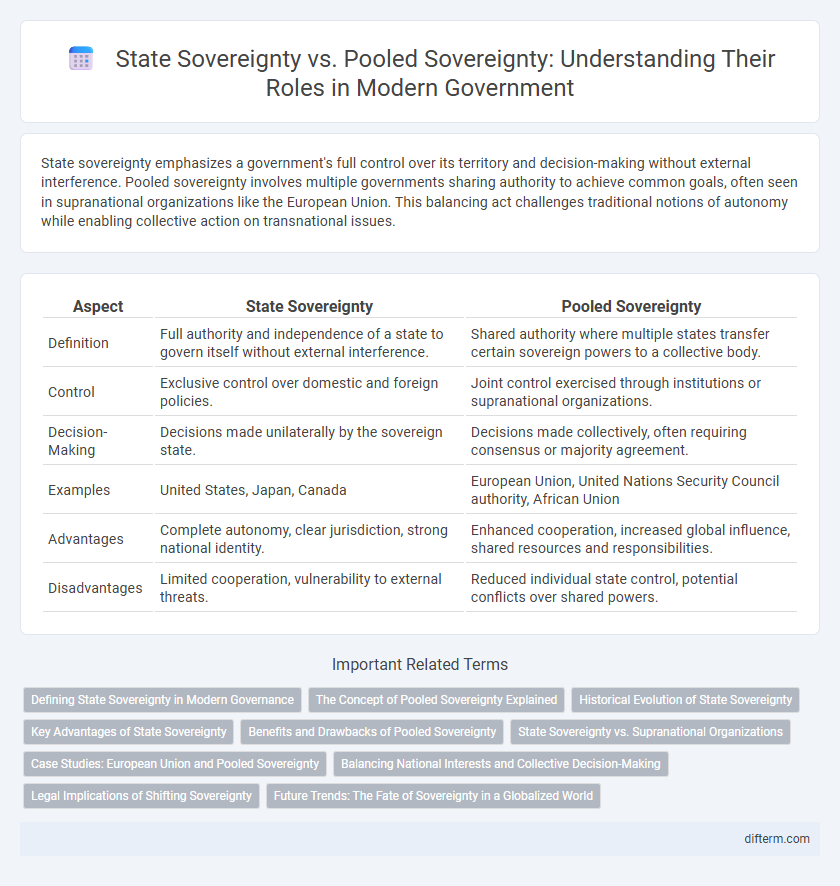State sovereignty emphasizes a government's full control over its territory and decision-making without external interference. Pooled sovereignty involves multiple governments sharing authority to achieve common goals, often seen in supranational organizations like the European Union. This balancing act challenges traditional notions of autonomy while enabling collective action on transnational issues.
Table of Comparison
| Aspect | State Sovereignty | Pooled Sovereignty |
|---|---|---|
| Definition | Full authority and independence of a state to govern itself without external interference. | Shared authority where multiple states transfer certain sovereign powers to a collective body. |
| Control | Exclusive control over domestic and foreign policies. | Joint control exercised through institutions or supranational organizations. |
| Decision-Making | Decisions made unilaterally by the sovereign state. | Decisions made collectively, often requiring consensus or majority agreement. |
| Examples | United States, Japan, Canada | European Union, United Nations Security Council authority, African Union |
| Advantages | Complete autonomy, clear jurisdiction, strong national identity. | Enhanced cooperation, increased global influence, shared resources and responsibilities. |
| Disadvantages | Limited cooperation, vulnerability to external threats. | Reduced individual state control, potential conflicts over shared powers. |
Defining State Sovereignty in Modern Governance
State sovereignty in modern governance refers to the absolute authority of a state to govern itself without external interference, emphasizing territorial integrity, political independence, and control over domestic affairs. Pooled sovereignty occurs when states voluntarily share or transfer some aspects of their sovereign powers to supranational institutions, enabling collective decision-making and cooperation on common issues. This balance between state sovereignty and pooled sovereignty shapes contemporary governance structures, particularly in multinational organizations and regional alliances.
The Concept of Pooled Sovereignty Explained
Pooled sovereignty refers to the agreement among multiple states to combine specific aspects of their sovereign authority to achieve common goals while retaining ultimate control over their individual powers. This concept enables governments to collaborate on issues such as trade, security, and environmental policy without surrendering full national sovereignty. By balancing state sovereignty with pooled decision-making, states enhance cooperation and address transnational challenges more effectively.
Historical Evolution of State Sovereignty
State sovereignty historically emerged from the Treaty of Westphalia in 1648, establishing the principle of territorial integrity and political autonomy within defined borders. Over time, globalization and international organizations such as the United Nations challenged absolute sovereignty, leading to the concept of pooled sovereignty where states voluntarily share authority for collective benefits. This evolution reflects a shift from rigid state-centric control toward cooperative governance structures that balance national interests with supranational obligations.
Key Advantages of State Sovereignty
State sovereignty ensures absolute control over a nation's laws, resources, and policies, enabling tailored governance that reflects unique cultural and economic contexts. It safeguards national identity and political independence by preventing external interference in domestic affairs. This autonomy promotes accountability and swift decision-making, empowering governments to address local needs effectively.
Benefits and Drawbacks of Pooled Sovereignty
Pooled sovereignty allows states to share decision-making authority in supranational institutions, enhancing collective problem-solving and increasing influence on the global stage. Benefits include stronger cooperation on transnational issues, resource pooling, and greater political stability among member states. Drawbacks involve reduced national autonomy, potential conflicts of interest, and challenges in balancing diverse priorities within the pooled framework.
State Sovereignty vs. Supranational Organizations
State sovereignty remains a fundamental principle where nations maintain full control over their laws, policies, and governance without external interference. Supranational organizations, such as the European Union, embody pooled sovereignty by enabling member states to delegate certain powers to centralized institutions for collective decision-making and enforcement. This balance challenges traditional notions of sovereignty as states weigh the benefits of cooperation against the desire to retain autonomous authority.
Case Studies: European Union and Pooled Sovereignty
State sovereignty traditionally implies full control over domestic and foreign policies by a nation-state, whereas pooled sovereignty involves sharing decision-making authority among multiple states to achieve common goals. The European Union exemplifies pooled sovereignty through its institutions, such as the European Commission and the European Court of Justice, which enforce collective regulations while member states retain core national powers. Case studies of the EU demonstrate how pooled sovereignty enhances cooperation, economic integration, and political stability by balancing national interests with supranational governance.
Balancing National Interests and Collective Decision-Making
Balancing national interests with collective decision-making requires states to navigate the tension between maintaining state sovereignty and engaging in pooled sovereignty arrangements. State sovereignty emphasizes exclusive control over domestic affairs, while pooled sovereignty involves sharing authority in supranational institutions to achieve common goals. Effective governance depends on reconciling these approaches to protect national priorities while fostering cooperation in regional or international frameworks such as the European Union.
Legal Implications of Shifting Sovereignty
Shifting sovereignty from state sovereignty to pooled sovereignty transforms legal accountability by redistributing authority among multiple entities, often complicating jurisdictional boundaries and enforcement mechanisms. This transition challenges traditional concepts of exclusive legal competence, leading to the emergence of supranational legal frameworks that can override national laws in specific domains. Courts and legal systems must adapt to layered sovereignty, where state laws coexist with, and sometimes yield to, collective decision-making bodies, affecting legislative autonomy and national judicial supremacy.
Future Trends: The Fate of Sovereignty in a Globalized World
State sovereignty is increasingly challenged by pooled sovereignty mechanisms such as regional unions and international organizations, which facilitate collective decision-making on global issues like climate change and security. Future trends indicate a complex balance between preserving national autonomy and embracing supranational frameworks to address transnational challenges effectively. Digital governance and multilateral treaties will play pivotal roles in redefining sovereignty boundaries within an interconnected global landscape.
state sovereignty vs pooled sovereignty Infographic

 difterm.com
difterm.com